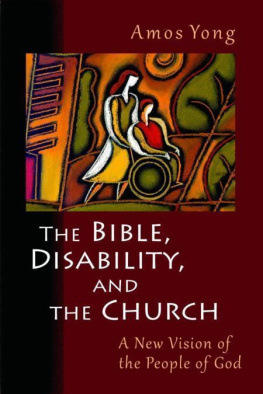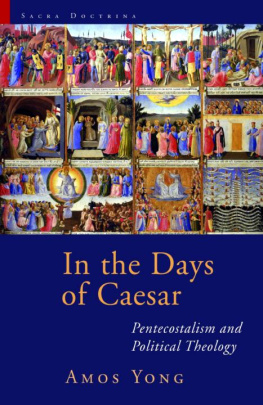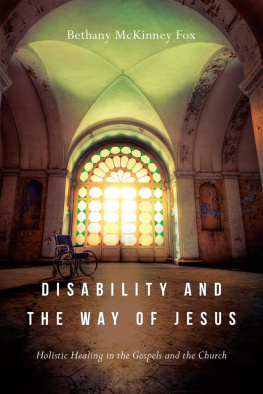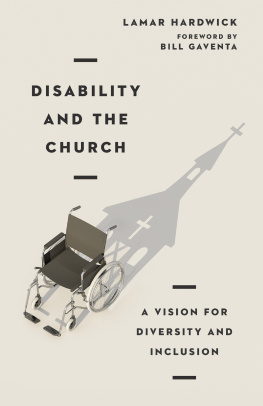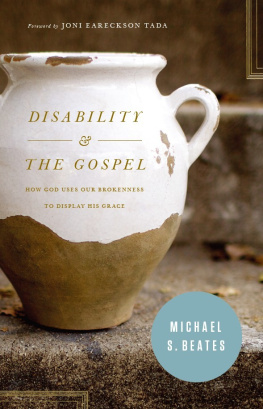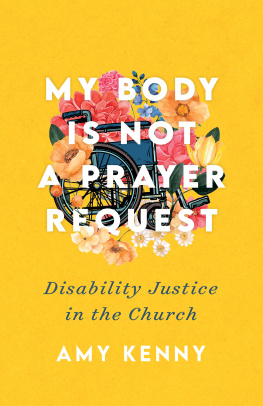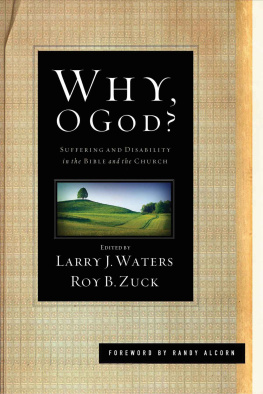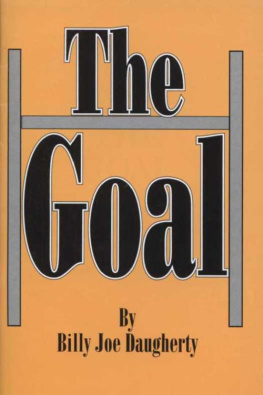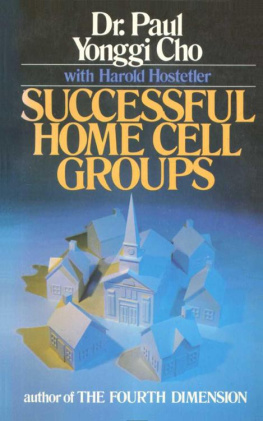Amos Yong - The Bible, Disability, and the Church: A New Vision of the People of God
Here you can read online Amos Yong - The Bible, Disability, and the Church: A New Vision of the People of God full text of the book (entire story) in english for free. Download pdf and epub, get meaning, cover and reviews about this ebook. year: 2011, genre: Religion. Description of the work, (preface) as well as reviews are available. Best literature library LitArk.com created for fans of good reading and offers a wide selection of genres:
Romance novel
Science fiction
Adventure
Detective
Science
History
Home and family
Prose
Art
Politics
Computer
Non-fiction
Religion
Business
Children
Humor
Choose a favorite category and find really read worthwhile books. Enjoy immersion in the world of imagination, feel the emotions of the characters or learn something new for yourself, make an fascinating discovery.
The Bible, Disability, and the Church: A New Vision of the People of God: summary, description and annotation
We offer to read an annotation, description, summary or preface (depends on what the author of the book "The Bible, Disability, and the Church: A New Vision of the People of God" wrote himself). If you haven't found the necessary information about the book — write in the comments, we will try to find it.
Amos Yong: author's other books
Who wrote The Bible, Disability, and the Church: A New Vision of the People of God? Find out the surname, the name of the author of the book and a list of all author's works by series.
The Bible, Disability, and the Church: A New Vision of the People of God — read online for free the complete book (whole text) full work
Below is the text of the book, divided by pages. System saving the place of the last page read, allows you to conveniently read the book "The Bible, Disability, and the Church: A New Vision of the People of God" online for free, without having to search again every time where you left off. Put a bookmark, and you can go to the page where you finished reading at any time.
Font size:
Interval:
Bookmark:

A New Vision of the People of God
Amos Yong
xi
The origins of this book derive from the invitation to be the sixth lecturer at Northwest University's Pentecostal Lectureship series in Kirkland, Washington, in February 2010. My thanks to Blaine Charette for initiating the invitation, for asking specifically that I address this important topic, and for organizing and hosting my visit. I am grateful also to Joseph Castleberry, Jack Wisemore, Bob Stallman, Jim Huegel, Weldyn Houger, and Brad Embry for their friendship and hospitality. Many others at Northwest University, including alumnus Rick Benjamin, provided feedback on the first draft of this text. Northwest students asked great questions during the lectures and during the classroom presentations as well.
I also presented a version of Chapter 4 as "The Church of the Weak and the Foolish: St. Paul as the First Theologian of (Intellectual) Disability!?" at California Baptist University in Riverside, California, on 25 March 2010. My thanks to Jeff McNair for organizing this and for being such a wonderful host on this occasion, and to Jeff Mooney and CBU's students in the M.A. in Disability Studies program for their excellent questions and comments at this lecture.
This is my first sustained venture into the field of biblical theology. I cannot adequately express my gratitude to Kerry Wynn for the time he took, on short notice, to read carefully a draft of the manuscript and to send many single-spaced pages of honest and critical comments. Kerry opened my eyes to how deeply I myself was mired in a normate (ablebodied) worldview, an irony indeed, considering that I am trying in this book to expose how such pre-understandings are at work in our reading of the Bible. I am grateful also to Sarah Melcher and Marty Mittelstadt for the feedback they provided on an earlier draft of this book. Further, thanks to my graduate assistant, Timothy Lim Teck Ngern, for his help in securing needed materials, his comments on the first draft, and his assistance with the indexes. None of these people should be held responsible for the text that follows; and, given my fallibility and the fact that I'm trying to cover a good deal of biblical ground in this book, it is with fear and trembling that I submit it to the academy and especially the church for consideration.
My thanks to Brill Publishers for giving me permission to revise and use two of my earlier published essays in Chapters 3 and 4 here: "Many Tongues, Many Senses: Pentecost, the Body Politic, and the Redemption of Dis/Ability" (PNEUMA: The Journal of the Society for Pentecostal Studies 31, no. 2 [2009]: 167-88), and "Disability and the Gifts of the Spirit: Pentecost and the Renewal of the Church" (Journal of Pentecostal Theology i9, no. i [2010]: 76-93).
Michael Palmer, my dean at Regent University School of Divinity, has been extremely gracious in supporting my scholarship in every conceivable way. Alma Yong, my sweetheart and wife for more than twenty-five years now, continues to provide the safe haven at home where I do most of my writing. I thank God for the blessings at home and at work that have allowed this book to be written.
I am excited that this book has found a home with Jon Pott and his team at Eerdmans. Michael Thomson was the first to wonder out loud if I had anything else Eerdmans might be interested in, and from there, things happened very quickly. It was also enjoyable to work with Mary Hietbrink. Her careful copyediting work resulted in a more accessible text. I am very grateful for my friends at Eerdmans.
Finally, I dedicate this book to three of my teachers at Western Evangelical Seminary (now George Fox Evangelical Seminary) who served as members on the committee assessing my master's thesis, which I defended in 1992. W. Stanley Johnson was my thesis advisor and taught the class on contemporary theology that I took at the end of my first year in seminary (spring 199o), during which I experienced my intellectual and theological auklarung. In a very real sense, my calling as a theologian was initiated during this experience, as I read James C. Livingstone's Modern Christian Thought: From the Enlightenment to Vatican II, and was gripped by Stan's lectures on Descartes, Kant, Hegel, Schleiermacher, and others. Irv Brendlinger taught classes on Wesley, agreed to oversee my independent research on him, and was disappointed that I didn't find Wesley as intrigu ing and relevant as he did. Yet, Irv, you should know that Wesley has emerged as an important dialogue partner in my Pentecostal scholarship over the years, and did play a key role in my constructive Pentecostal theology of science and of nature in an earlier book (The Spirit Poured Out on All Flesh: Pentecostalism and the Possibility of Global Theology, published by Baker Academic in 2005). Susie C. Stanley (now at Messiah College) taught me Christian history, introduced me to the Society for Pentecostal Studies (when she found out I was a Pentecostal asking theological questions), and urged me to begin publishing by writing book reviews. Susie, as you well know, I haven't stopped reviewing books or writing since! Each of these teachers has modeled the possibility of a Wesleyan form of evangelical scholarship that continues to inform my theological identity. Thanks, Stan, Irv, and Susie, for sharing your lives with me. It is in part because of your influences that I consider my work also to be an expression of Wesleyan theology in the broader evangelical tradition.
Disability and the People of God - Whole or Fragmented?
This is a book about disability; it is also a book about the church, and what it means to be the church in light of the experience of disability. But I don't claim to have the once-and-for-all final say or absolute truth about these matters; rather, I submit these ideas as arising out of my own experience growing up with a brother with Down syndrome.
Growing Up with a Brother with Down Syndrome
I was almost ten years old when my brother Mark was born. He spent the first three weeks of his life on a life-support system because he could neither breathe nor suckle on his own. I dimly recall peering at his frail, tiny body from the corridor outside the hospital room in which his incubator was kept. I only knew something was terribly wrong - partly because my mother cried a lot and even my father was worried (which wasn't typical for him) - so I prayed earnestly that my brother would pull through.
Many others prayed as well. At the time, my parents were the senior pastors of a thriving congregation in Petaling Jaya (a suburb of Kuala Lumpur, the capital city of West Malaysia), and our home was continuously open to the parishioners. These few weeks were unusually busy as congregants came and went, crying with my mother and praying with us. Why wasn't Mark responding to the treatment? These three weeks seemed like an eternity - at least that was how it must have felt to my parents.
Font size:
Interval:
Bookmark:
Similar books «The Bible, Disability, and the Church: A New Vision of the People of God»
Look at similar books to The Bible, Disability, and the Church: A New Vision of the People of God. We have selected literature similar in name and meaning in the hope of providing readers with more options to find new, interesting, not yet read works.
Discussion, reviews of the book The Bible, Disability, and the Church: A New Vision of the People of God and just readers' own opinions. Leave your comments, write what you think about the work, its meaning or the main characters. Specify what exactly you liked and what you didn't like, and why you think so.

